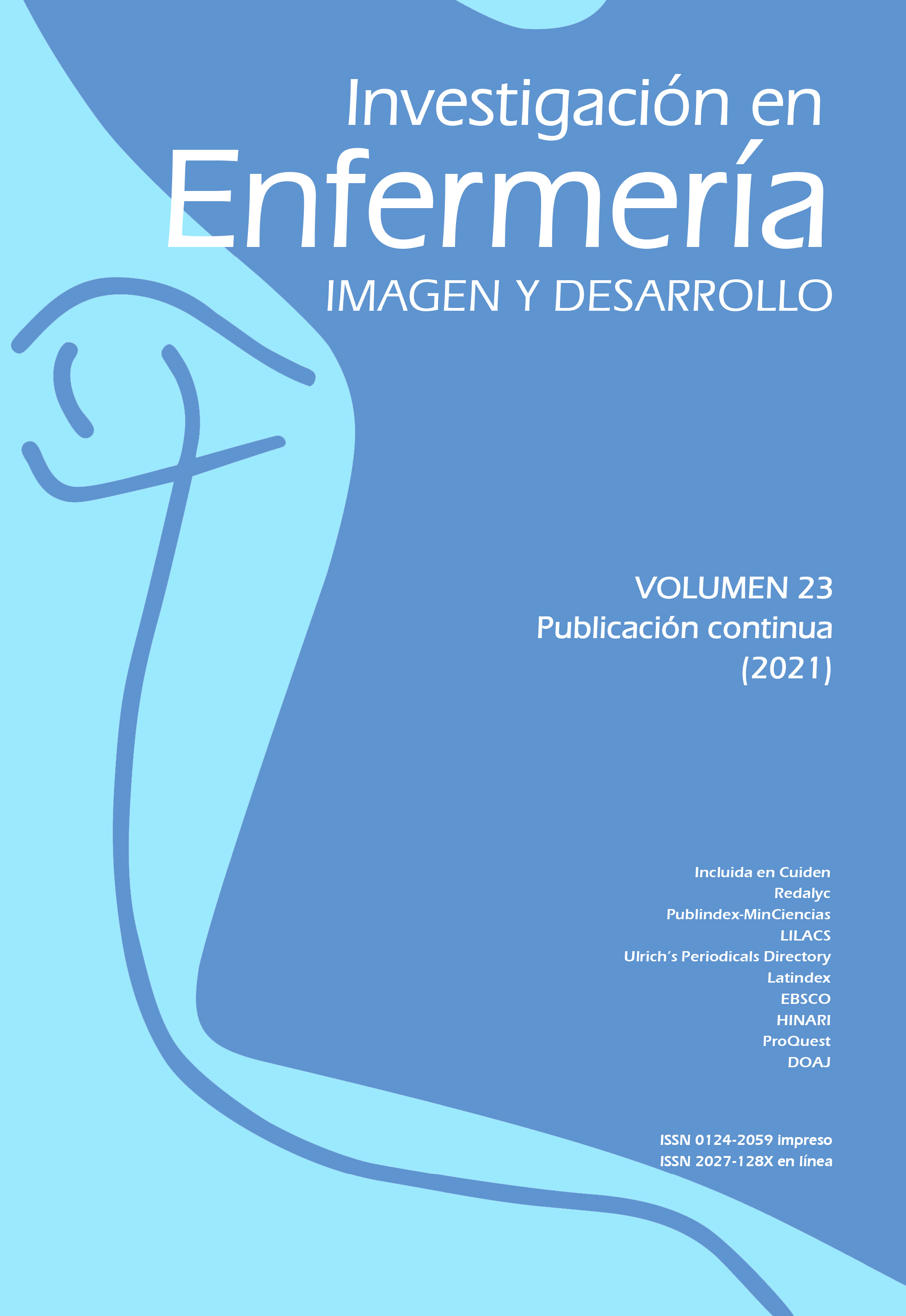Abstract
Introduction: Hearth Failure (HF) is one of the cardiovascular diseases with higher numbers of admissions in the ICU. In these diseases, it is a must to determine the factors associated with re-admission like the treatment adherence and social support. Objective: To determine the relationship between treatment adherence and social support in patients with HF. Methods: A correlational study with non-probabilistic sampling was conducted. The sample size was 64 patients diagnosed with HF. To measure the adherence level, the adherence behavior evaluation scale with a Cronbach’s alpha of 0.72 was used. To measure the social support perception, the Medical Outcomes Study Social Supportsurvey (MOS) with a Cronbach’s alpha of 0.94 was used. A descriptive analysis was carried out and in order to determine how the adherence level is related to the social support, the Fisher’s test for categorical distributions was applied. Results: Most of the subjects showed a level of frequently an adhered to the treatment (56.2%). The global index of social support was found with values in a mean range (mean: 76.18). The association between the treatment adherence, social support (p: 0.006336) and affective support (p: 0.03025) was moderate. Conclusions: There is an association between the treatment adherence and social support. Therefore, it is pivotal that the nurse include the evaluation and intervention of social support before the patient’s discharge in order to optimize the adherence levels.
Gómez-Mesa JE, Saldarriaga C, Jurado AM, Mariño A, Rivera A, Herrera Á, et al. Consenso colombiano de falla cardíaca avanzada: capítulo de falla cardíaca, trasplante cardíaco e hipertensión pulmonar de la sociedad colombiana de cardiología y cirugía cardiovascular. Rev Colomb Cardiol. 2019;26(S2):3-24.https://doi.org/10.1016/j.rccar.2019.06.001
Benjamin EJ, Muntner P, Alonso A, Bittencourt MS, Callaway CW, Carson AP, et al. Heart disease and stroke statistics 2019. Clinical Statements and guidelines. Circulation. 2019;139(10):e56-e528. https://doi.org/10.1161/CIR.0000000000000659
Avella-Tolosa AJ. Análisis De Situación De Salud (ASIS). Bogotá: Ministerio de Salud y Protección social; 2019 mayo. 1.
Organización Mundial de la Salud. Adherencia a los tratamientos a largo plazo. Pruebas para la acción. Ginebra: Organización Mundial de la Salud; 2004.
Viñas-Vera C, García-Parra AM, Morales-Gil IM. Género y efectividad de la metodología enfermera en pacientes con insuficiencia cardiaca. Aquichan. 2016;16(3):313-327. https://doi.org/10.5294/aqui.2016.16.3.4
Cuadra-Peralta A, Medina-Cáceres EF, Salazar-Guerrero KJ. Relación de bienestar psicológico, apoyo social, estado de salud física y mental con calidad de vida en adultos mayores de la ciudad de Arica. Límite. 2016;35(11):56-67.
Marín-Bustamante D, Sanhueza-Alvarado O. Apoyo Social: Uso del Concepto en Enfermería. Rev Horiz Enferm. 2016;27(2):32-40. https://doi.org/10.7764/Horiz_Enferm.27.2.41
Peterson SJ, Bredow TS. Middle range theories: application to nursing research. 3ed. Filadelfia: Wolters Kluwer Health; 2013. Cap. IV, Social Support Marjorie A. Schaffer; p. 108-112.
Achury-Saldaña DM, Sepúlveda-Carrillo GJ, Rodríguez-Colmenares SM, Giraldo IC. Validez y confiabilidad de un instrumento evaluativo de adherencia en pacientes con falla cardiaca. Enferm Global. 2012;11(26):1-9. https://dx.doi.org/10.4321/S1695-61412012000200001
Londoño-Arredondo NE, Rogers H, Castilla-Tanga JF, Posada-Gómez SR, Ochoa-Arizal NL, Jaramillo-Pérez MA, et al. Validación en Colombia del cuestionario MOS de apoyo social. Int. J. Psychol. Res. 2012;5(1):142-150. http://mvint.usbmed.edu.co:8002/ojs/index.php/web
Sánchez SV, Olmos-Jiménez R, Ramírez-Roig C, García-Sánchez MJ, Valderrey-Pulido M. Adherencia al tratamiento en pacientes mayores de 65 años que sufren reingresos precoces. Farm Hospit. 2017;42(4):147-151. https://doi.org/10.15446/revfacmed.v64n4.52217
Arcos-Medina, L. C., Méndez-Toro, A., Rojas-Ruiz, I. T., Torres, S., & Tabares, S. C. Caracterización clínico epidemiológica de pacientes hospitalizados con diagnóstico de falla cardiaca descompensada con fracción de eyección reducida del Hospital Militar Central. Acta médica colombiana. 2020;45(1). https://doi.org/10.36104/amc.2020.1233
Muñoz-Mejía OA, Sierra-Vargas EC, Zapata-Cárdenas A, Isaza-Montoya M, Muñoz-Cifuentes MA, Sánchez-Echavarría JD. Caracterización sociodemográfica y clínica de una población con falla cardíaca aguda: cohorte MED-ICA. 2018;25(3):200-208. https://doi.org/10.1016/j.rccar.2017.12.021
Rojas-Sánchez LZ, Echeverría-Correa LE, Camargo-Figueroa FA. Adherencia al tratamiento farmacológico y no farmacológico en pacientes con falla cardiaca. Rev Elect Trim Enferm. 2014;36:1-14. https://doi.org/10.6018/eglobal.13.4.178311.
Chang LL, Xu H, DeVore AD, Matsouaka RA, Yancy CW, Fonarow GC, Allen LA, Hernandez AF. Timing of Postdischarge Follow-Up and Medication Adherence Among Patients with Heart Failure. JAHA. 2018;7(7). https://doi.org/10.1161/JAHA.117.007998
Cancino M, Rehbein-Felmer L, Ortiz MS. Funcionamiento cognitivo en adultos mayores: rol de la reserva cognitiva, apoyo social y depresión. Revista médica de Chile. 2018;146(3):315-322. http://dx.doi.org/10.4067/s0034-98872018000300315
Molano Barrera D, González Consuegra R. Factores deteriorantes de la calidad de vida en insuficiencia cardiaca: revisión integrativa. Duazary. 2021;18(1):86-98. https://doi.org/10.21676/2389783X.3889
Gottlieb BH. Support Interventions: a typology and agenda for research. Handbook of personal relationships. Nueva York: Wiley and Sons; 1988.
Cené CW, Haymore, LB, Dolan-Soto D, Lin FC, Pignone M, Dewalt, DA, Wu JR, Jones CD, Corbie-Smith G. Self-care confidence mediates the relationship between perceived social support and self-care maintenance in adults with heart failure. J. Card. Fail. 2013;19(3):202-210. https://doi.org/10.1016/j.cardfail.2013.01.009

This work is licensed under a Creative Commons Attribution 4.0 International License.
Copyright (c) 2022 Investigación en Enfermería Imagen y Desarrollo



